Sayoni was founded in 2006 by six women from diverse backgrounds, age, economic status and ethnicities.
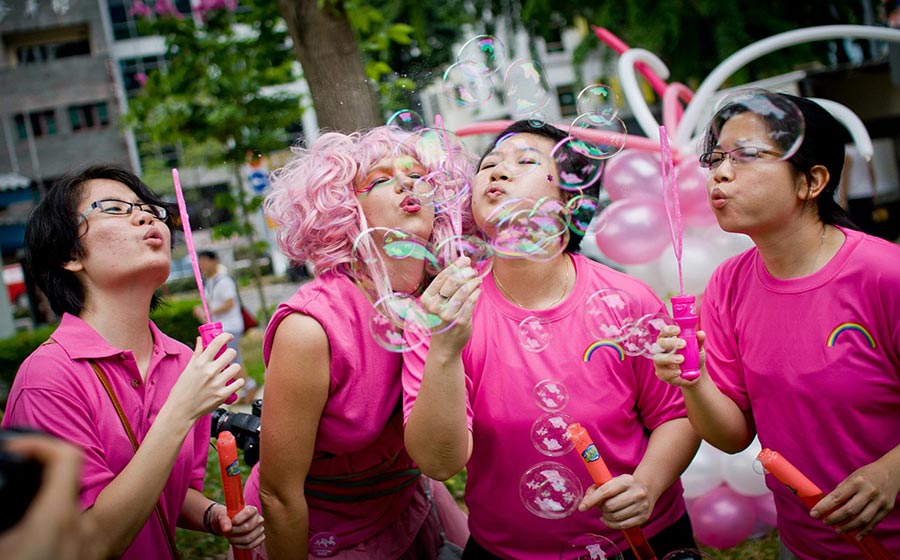
Sayoni was founded in 2006 by six women from diverse backgrounds, age, economic status and ethnicities. They came together to increase queer women’s leadership in social justice activism and the advancement of LGBT rights. They engage in a variety of strategies, from hosting public forums and cultural organizing for “Indignation,” Singapore’s Pride Month, advocacy with state institutions, increasing representation of LGBTQ issues in the media, using UN mechanisms, regional advocacy, to research and advocacy on LGBT rights . Taking a explicitly rights based approach to activism, they often work with broader civil society groups to assert the recognition of LGBTQ lives and communities in the context of wider social and political goals. Similarly within the LGBTQ movement, they resist ‘single issue and identity-based politics’ and raise the visibility of LBT communities. In 2016, Sayoni launched a highly popular activism event called “Human Writes,” which brings together participants from all walks of life to compete in a spoken word competition on a range of human rights themes. At the regional level, Sayoni is an active member of the ASEAN SOGIE Caucus and along with the Chinese Lala Alliance, is hosting a South-South learning hub to share skills and train LGBTQ communities on using treaty bodies like CEDAW and CRC to make changes back in their respective countries.
Saint Lucia’s first and only LGBT organisation, United and Strong Inc. was formed in response to the HIV/AIDS epidemic.
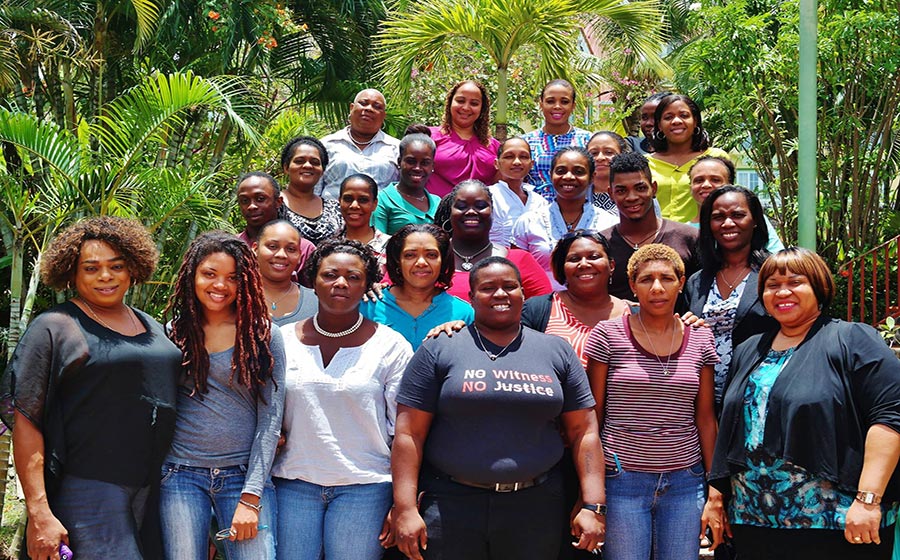
Saint Lucia’s first and only LGBT organisation, United and Strong Inc. (U&S) is a non-profit human rights organization formed in 2001 and registered in November of 2005 in collaboration with the Caribbean AIDS Alliance and AIDS Action Foundation in response to the HIV/AIDS epidemic. Its aim was to reach men sleeping with men; however U&S has always worked actively with women sleeping with women. United and Strong foundation is to build and provide an enabling environment for the advancement of human rights of the LGBT community in Saint Lucia. Our main goal as a community is to advocate for the human rights of all persons, to encourage respect and acceptance for diversity; eliminate stigma and discrimination while creating a just society where everyone is equal; not just in words but in actions.
United and Strong provides legal resources and psychosocial accompaniment to LGBT members who have experienced human rights violations. Apart from advocacy, the organization also conducts education sessions, trainings, human rights documentation, and local/regional advocacy and media to raise awareness about the human rights of LGBT people. United and Strong serves as the ILGA Women’s Secretariat.
UHAI is Africa’s first indigenous activist led and managed fund for and by sex workers and sexual and gender minorities.
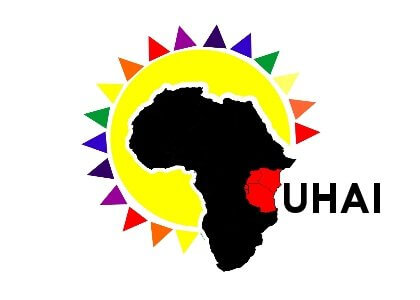
UHAI is Africa’s first indigenous activist led and managed fund for and by sex workers and sexual and gender minorities. UHAI believes in African activists’ voice in resourcing the struggle for equality, justice and dignity for Africa’s sex workers and sexual and gender minorities. UHAI is changing the narrative of how Africa’s human rights and health struggles are resourced from one of ‘foreign assistance’ to one of ownership and self-determination by the very activists who live the struggles. UHAI supports civil society organising for and by sex workers and sexual and gender minorities in Burundi, the Democratic Republic of Congo, Ethiopia, Kenya, Rwanda, Tanzania and Uganda with flexible and accessible grants; capacity support; support for Pan-African advocacy and organising (including support for activist-led convening); and research and documentation. Over the last 7 years, UHAI has made US$6 million in grants to Eastern Africa’s sex workers and sexual and gender minorities. Eastern African activists themselves determine most of these grants. UHAI has provided multi-year capacity support to more than 50 community organisations; supported numerous Pan-African advocacy engagements and convening; and contributed to the repertoire of knowledge on Eastern Africa LGBTI and sex worker human rights and health. UHAI just concluded a landscape analysis of the context in which Eastern Africa’s trans, intersex and gender non-conforming communities organise and exist. The analysis shares information on five thematic focus areas: legal environment, public discourse, health, lived realities and organising landscape.
Shades of Yellow’s mission was to cultivate a community of empowered HAPI LGBTQI (Hmong and Asian Pacific Islander, Lesbian, Gay, Bisexual, Transgender, Queer and Intersex) and allies.
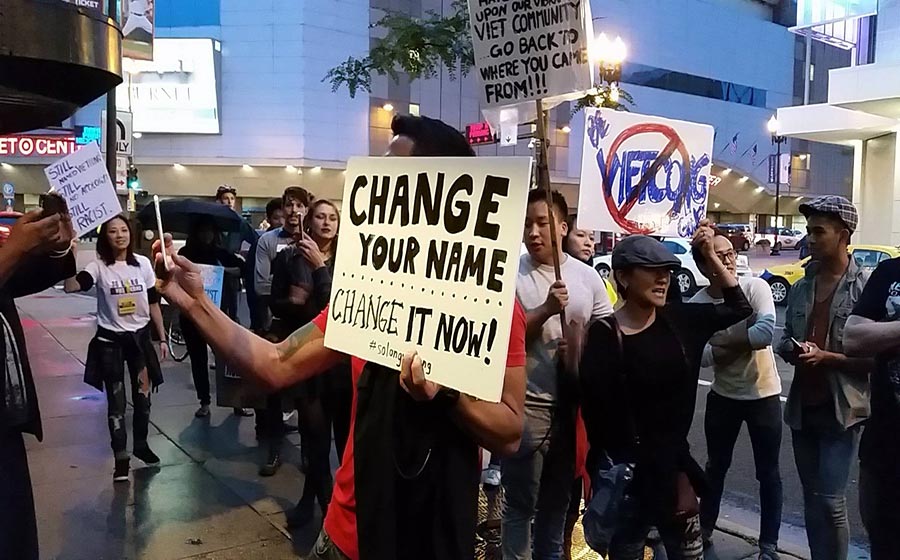
Shades of Yellow’s mission was to cultivate a community of empowered HAPI LGBTQI (Hmong and Asian Pacific Islander, Lesbian, Gay, Bisexual, Transgender, Queer and Intersex) and allies to challenge what we’ve been told about API and LGBTQI communities, and ignite positive cultural and social change. SOY’s vision was a world where HAPI LGBTQI and allies are liberated and celebrated for who they are. Existing in HAPI cultural communities where being LGBTQI or gender-nonconforming means risking displacement, disownment, and disconnection to families and community, SOY worked to make it possible for constituents to remain visible, be present in community, and acknowledge the complex intersections of their identities, identities for which many Asian languages have no words (Lesbian, Gay, Bisexual, Transgender, Queer, or Intersex). This meant challenging their cultural communities to make room for all people and to acknowledge that LGBTQI people exist. In order to address and impact change, SOY used 3 main strategies: arts and culture, leadership development, and community building.
This organization was supported through the Funding Queerly Giving Circle, which is housed at Astraea.
Founded in 2007, the Grupo Latinoamericano de Estudio, Formación y Acción Feminista (GLEFAS) is a leading regional group that is initiating important dialogues, conversations, and political actions within the feminist and lesbian feminist movement.
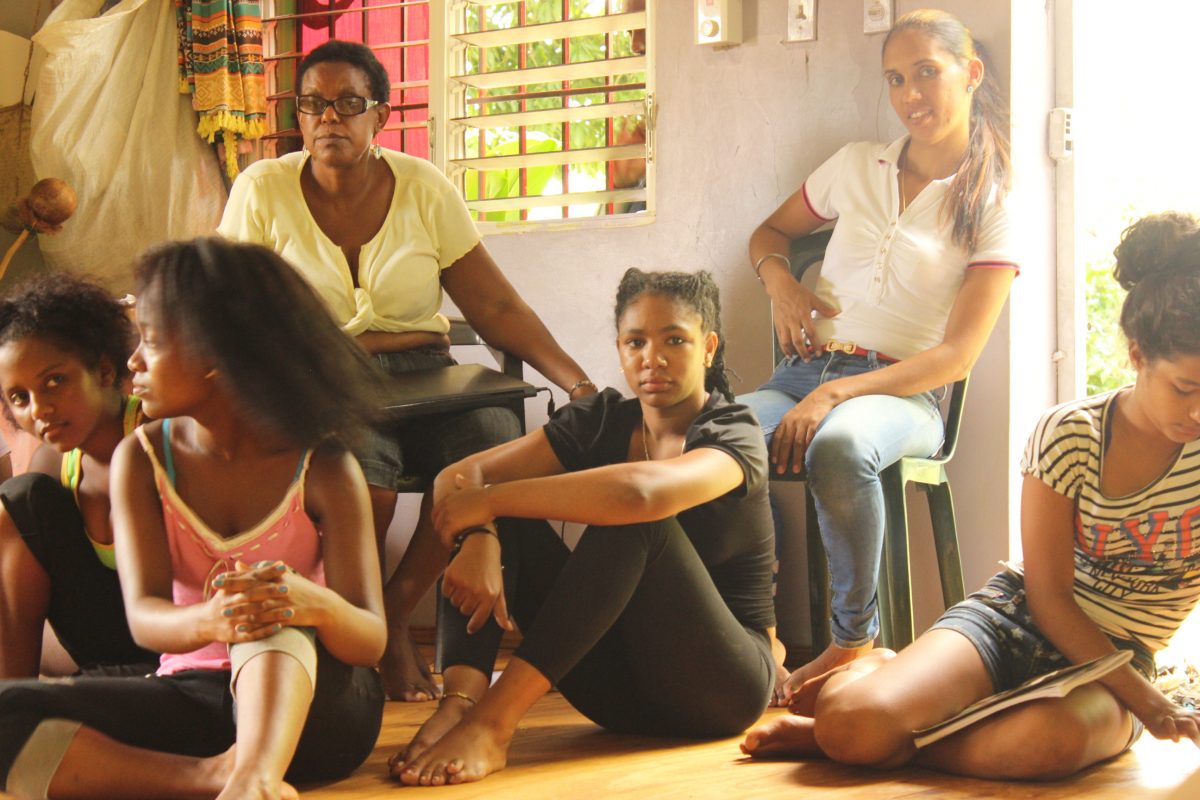
Founded in 2007, the Grupo Latinoamericano de Estudio, Formación y Acción Feminista (GLEFAS) is a leading regional group that is initiating important dialogues, conversations, and political actions within the feminist and lesbian feminist movement in Latin América and the Caribbean, as well as other social movements and land struggles in the region, looking to join efforts for more comprehensive policies to confront different forms of oppression. As Caribbean and Latin American anti-racist and decolonial feminists, one of their goals is to produce autonomous knowledge from their own positioning as black, indigenous, and lesbian activists from the South. They collaborate with non-white and mixed-race women (or women of color, as it is commonly used in the United States) who are committed to intersectional politics and views in Argentina, Colombia, Guatemala, Honduras, Costa Rica, Peru, Dominican Republic, Mexico, Ecuador, Brazil, the United States, and Europe. In response to the regional context of war, militarization, and violence, GLEFAS seeks to produce a political analysis from an anti-racist, anti-military, anti-colonial, anti-capitalist, feminist lesbian perspective. GLEFAS seeks to support the creation of collectives in different countries of the region. *** En Español*** Fundado en 2007, el Grupo Latinoamericano de Estudio, Formación y Acción Feminista (GLEFAS) es un grupo regional líder que está iniciando importantes diálogos, conversaciones y acciones políticas dentro del movimiento feminista y lésbico feminista de América Latina y el Caribe, así como con otros movimientos sociales y de luchas territoriales en la región en la búsqueda de aunar esfuerzos para políticas más integrales que impliquen enfrentar diferentes formas de la opresión. Una de sus metas como feministas antirracistas y descoloniales latinoamericanas y caribeñas es producir un conocimiento autónomo desde sus propios posicionamientos como activistas lesbianas, indígenas y negras del sur. Colaboran con mujeres no blancas y mestizas comprometidas con una mirada y una política interseccional (o de color, como se dice comúnmente en Estados Unidos) en Argentina, Colombia, Guatemala, Honduras, Costa Rica, Perú, República Dominicana, México, Ecuador, Brasil, Estados Unidos y Europa. En respuesta al contexto regional de guerra, militarización y violencia, GLEFAS busca producir un análisis político desde una perspectiva feminista y lésbica antirracista, antimilitarista, anticolonial y anticapitalista. GLEFAS busca apoyar la formación de colectivos en diferentes países en la región.
Founded in 2006, interACT is the first and only organization in the U.S. to undertake a coordinated strategy of legal advocacy for the rights of intersex children while raising awareness and developing intersex youth advocates.
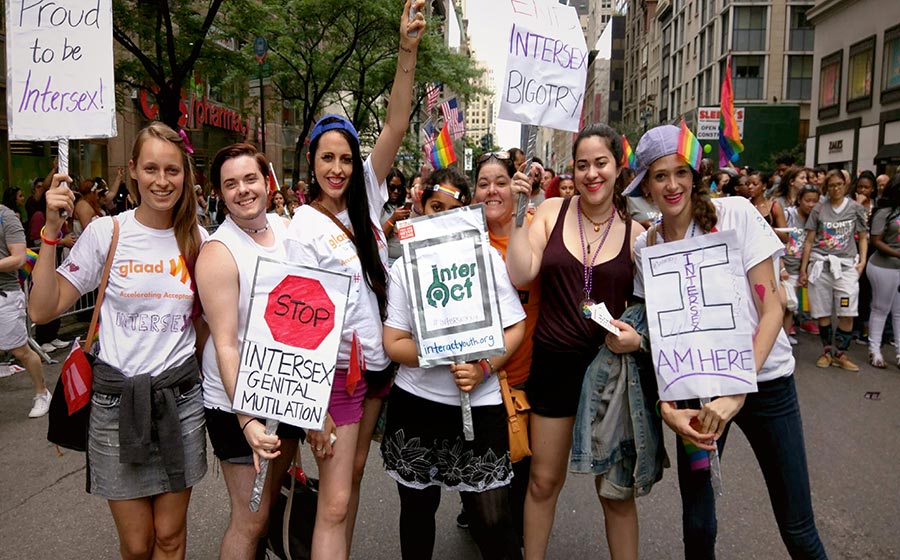
Founded in 2006, interACT is the first and only organization in the U.S. to undertake a coordinated strategy of legal advocacy for the rights of intersex children while raising awareness and developing intersex youth advocates. It’s work is dividted into three main areas: Law and Policy, Youth and Media.
Intersex children have unique legal needs related to questions about informed parental consent for treatment, minors’ participation in decision-making, reproductive rights, medical malpractice and school harassment and accommodation, among other issues. interACT’s primary goal is to end the practice of unnecessary harmful medical treatment and genital surgeries on children born with intersex traits. interACT Law and Policy works to inform and educate both parents and doctors, change laws in the U.S., and influence global policies to protect the rights of intersex children.
interACT Youth fosters intersex youth leadership development to help raise public awareness. interACT Youth recently consulted with MTV to develop an honest and respectful portrayal of an intersex individual in the mainstream TV comedy, “Faking It” and Youth members frequently tell their stories to the media, at schools and conferences. The young advocates have published three brochures echoing their own voices: What We Wish Our Doctors Knew; What We Wish Our Parents Knew, and What We Wish Our Friends Knew.
Founded in 2005, Lesbian Independent, Feminist and Socialist Lesbian (LIFS) has been a grantee partner of Astraea since 2008.
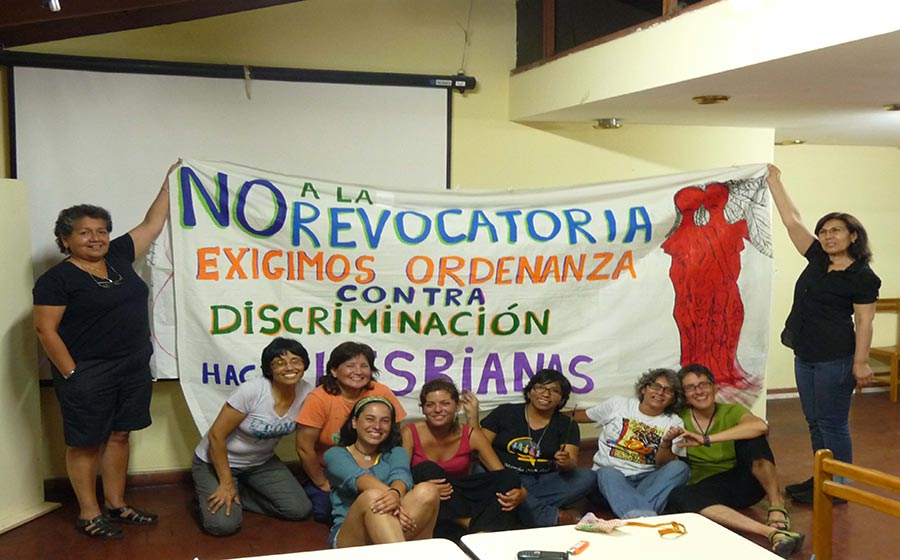
Founded in 2005, Lesbian Independent, Feminist and Socialist Lesbian (LIFS) has been a grantee partner of Astraea since 2008. LIFS is one of the oldest lesbian organizations in Peru. It is well-known and well-connected with the Peruvian feminist movement and over the years has created a voice in policy advocacy spaces such as the Ministry of Women. It believes that policy changes have to be accompanied by feminist transformations and, to this end, it organizes forums with young lesbians to provide feminist political education, works in coalition with LGBT and non-LGBT organizations, and one of its primary goals is to create networks. It also has a well-known “Batukada Lesbian Feminist Voices Les,” which is a type of grassroots political protest in the Latin American and Caribbean region, in which members go out to rallies and protests with drums and sing popular songs that are adapted to convey political messages. *** En Español*** Fundada en 2005, Lesbianas Independientes, Socialistas y Feministas (LIFS) ha sido co-parte de Astraea desde 2008. LISF es una de las organizaciones lésbicas más antiguas de Perú. Es bien conocida y está bien conectada con el movimiento feminista peruano y a través de los años ha creado a una voz en espacios de defensoría de políticas como el Ministerio de la Mujer. Cree que los cambios de políticas tienen que estar acompañados por transformaciones feministas y, para este fin, organiza foros con lesbianas jóvenes para brindar educación política feminista, trabaja en coalición con organizaciones LGBT y no LGBT, y una de sus metas primordiales es crear redes. También tiene una muy conocida “Batukada Lésbica Feminista Voces Les”, la cual es un tipo de protesta política de base en la región de Latinoamérica y el Caribe, en la cual las personas miembro salen a mítines y protestas con tambores y cantan canciones populares con líricas adaptadas para transmitir mensajes políticos.
Colectivo Sentimos Diverso is a feminist group that mobilizes to create and develop projects and actions that empower women, adolescents, young people and people with sexual orientations and diverse gender identities for the enforceability of human, sexual and reproductive rights.
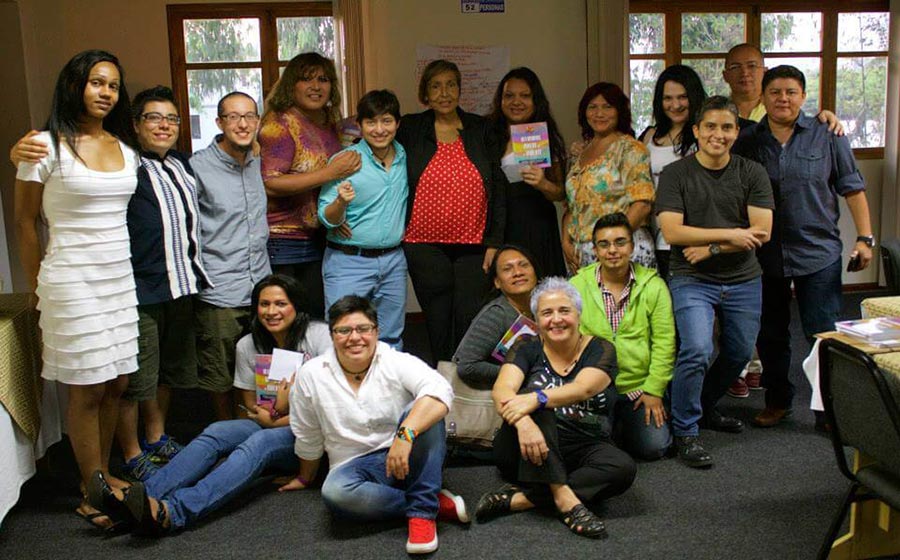
Colectivo Sentimos Diverso is a feminist group that mobilizes to create and develop projects and actions that empower women, adolescents, young people and people with sexual orientations and diverse gender identities for the enforceability of human, sexual and reproductive rights. They seek to build a more just, inclusive and violence-free world. They started their work in 2006 in the city of Bogotá. Since 2011, they have moved to the city of Quito, Ecuador, where they have focused on developing three lines of action:
- Pedagogical
- Communication and Networks
- Research and creation
In September of 2015, the Ecuadorian government recognized their foundation status. Their local work is recognized and strengthened by their visibility and impact at the regional level. They are part of the Campaign for the Inter-American Convention on Sexual Rights and Reproductive Rights and the Southern Transfusionist Network (in development).
*** En Español***
Somos un colectivo feminista que se moviliza para crear y desarrollar proyectos y acciones que empoderen a mujeres, adolescentes, jóvenes, y personas con orientaciones sexuales e identidades de género diversas para la exigibilidad de los derechos humanos, sexuales y reproductivos. Buscamos construir un mundo más justo, incluyente y libre de violencias.
Iniciamos nuestro trabajo en el año 2006 en la ciudad de Bogotá. Desde el año 2011 nos trasladamos a la ciudad de Quito, Ecuador, en dónde nos hemos centrado en desarrollar tres líneas de acción:
- Pedagógica
- Comunicación y redes y
- Investigación y creación.
En septiembre de 2015 el gobierno ecuatoriano reconoció nuestra personería jurídica, bajo la forma de Fundación.
Nuestro trabajo local es reconocido y fortalecido por nuestra visibilidad e incidencia a nivel regional. Hacemos parte de la Campaña por la Convención Interamericana de Derechos Sexuales y Derechos Reproductivos y la Red Transfeministas del Sur (en desarrollo).
Based in Quito, Taller de Comunicación Mujer (TCM) is a women’s rights organization that works to advance the human rights of lesbian and bisexual women.
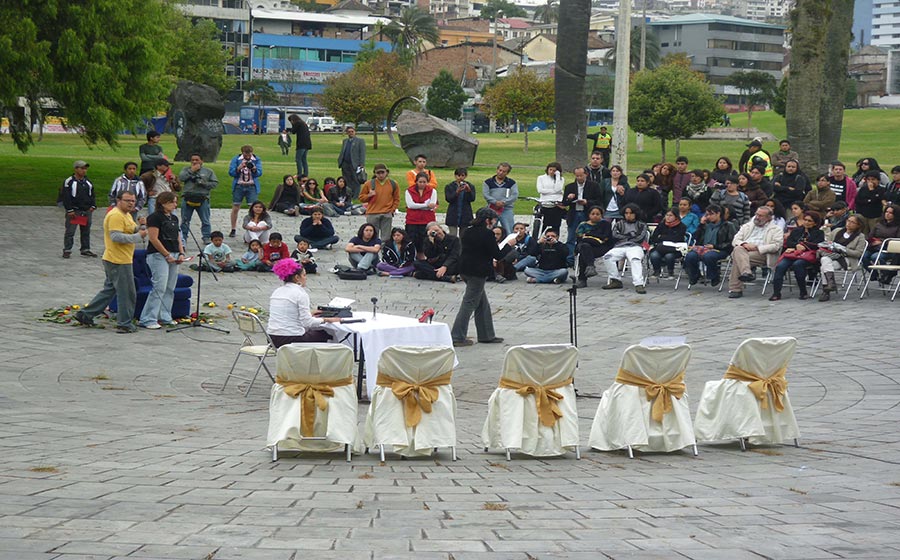
Based in Quito, Taller de Comunicación Mujer (TCM) is a women’s rights organization that works to advance the human rights of lesbian and bisexual women. TC Women documents and monitors the “de-homosexualization clinics” and human rights violations within them. In 2011, TC Mujer was responsible for ensuring that CETFDCM (the CEDAW) and the Human Rights Council recommended and monitored the closure of all clinics by the Ecuadorian state. TC Women has helped close many of these clinics. TC Mulher continues to document and monitor clinics in four provinces (Guayaquil, Manabí, Pichincha and Azuay), documenting survivors’ testimony and monitoring the Ministry of Health, while pursuing a broader feminist advocacy for women’s sexual and reproductive rights. *** En Español*** Con base en Quito, el Taller de Comunicación Mujer (TC Mujer) es una organización de derechos de las mujeres que trabaja por el avance de los derechos humanos de las mujeres lesbianas y bisexuales. TC Mujer documenta y monitorea las “clínicas de deshomosexualización” y las violaciones de derechos humanos dentro de estas. En 2011, TC Mujer fue responsable por lograr que la CETFDCM (también conocida como CEDAW, por sus siglas en inglés) y el Consejo de los Derechos Humanos recomendaran y monitorearan el cierre de todas las clínicas por el estado ecuatoriano. TC Mujer ha ayudado a cerrar muchas de estas clínicas. TC Mujer continúa documentando y monitoreando clínicas en cuatro provincias (Guayaquil, Manabí, Pichincha y Azuay), documentando testimonios de sobrevivientes y monitoreando al Ministerio de Salud, a la vez que realiza una abogacía feminista más amplia por los derechos sexuales y reproductivos de las mujeres.
Causana has carried out awareness raising on LGBT realities with hundreds of public servers in the judicial and health sectors, targeting mainly health providers, police and prosecutors.
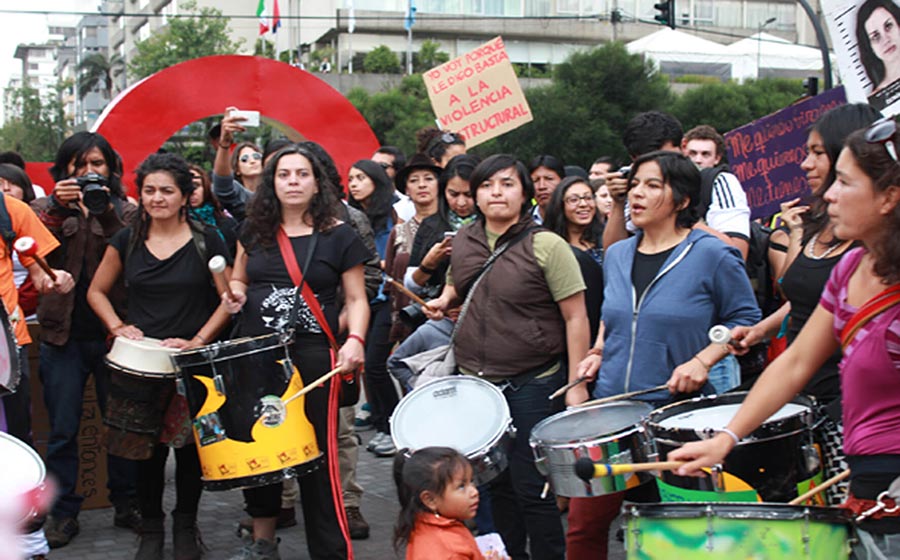
Founded in 2003, Causana is a lesbian feminist collective located in Quito that has fought for the closure of “dehomosexualization clinics” for several years. It also provides legal and psychological support to lesbian survivors of these clinics. Causana has carried out awareness raising on LGBT realities with hundreds of public servers in the judicial and health sectors, targeting mainly health providers, police and prosecutors; it has also done so with various sectors of society: older adults, teachers, students, families, youth sectors, public servers, etc. Through community mobilization and six National Lesbian Encounters as well as training processes and public actions to raise awareness and denounce, Causana has strengthened the capacity of LBT women to demand their rights and access a life of freedom. Causana’s mission is to de-structure the systems of power and subordination through the empowerment and empowerment of LBT people from an inclusive approach of genres, diversities and holism to develop a new community co-existence proposal within a framework of harmony with others. *** En Español*** Fundada en 2003, Causana es una colectiva lésbica feminista ubicada en Quito que se destaca por su lucha contra los encierros en las llamadas “clínicas de deshomosexualización” desde hace varios años. También ofrece apoyo legal y psicológico a sobrevivientes lesbianas de estas clínicas. Causana ha realizado capacitaciones de sensibilización sobre las realidades LGBT con cientos de servidorxs públicxs en los sectores judicial y de salud, dirigiéndose principalmente a lxs proveedorxs de salud, la policía y la Fiscalia; de igual manera lo ha hecho con diversos sectores de la sociedad: adultxs mayores, docentes, estudiantes, familias, sectores juveniles, servidorxs públicxs, etc. Mediante la movilizacion comunitaria y seis Encuentros Nacionales Lesbicos así como procesos de capacitación y acciones públicas de visibilización y denuncia, Causana ha fortalecido la capacidad de las mujeres LBT para exigir sus derechos y acceder a una vida de libertades. La misión de Causana es desestructurar los sistemas de poder y subordinación a través del empoderamiento y fortalecimiento de las personas LBT desde un enfoque inclusivo de géneros, diversidades y holismo para desarrollar una nueva propuesta de convivencia comunitaria en un marco de armonía con nostrxs, lxs otrxs y la Pacha Mama.











